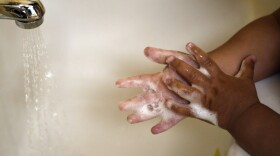
Jane Greenhalgh
Jane Greenhalgh is a senior producer and editor on NPR's Science Desk.
She produces the weekly Health segment on NPR's Morning Edition and writes and edits for NPR's health blog, "Shots." Greenhalgh also produces stories on science, health, and global health across NPR's many platforms.
Greenhalgh was part of the team of broadcast, digital, and multimedia journalists who produced the 2015 award-winning series "#15Girls," which examined the struggles teenage girls face throughout the developing world. Greenhalgh's story "Banished to the Shed" was one of NPR's most listened to and viewed stories of 2015.
She has twice won the National Academies of Science Communication award for her work on NPR's 2014 series "The human microbiome: guts and glory" and the 2009 series Climate Connections. She traveled extensively for this year-long, multi-platform project, examining how climate change is affecting people across the globe. From Timbuktu, where the desert nomads are giving up their way of life, to Peru, where potato farmers are moving their crops higher up the mountain, and to Bangladesh, where scientists are experimenting with drought and flood resistant rice, the stories Greenhalgh produced chronicled the impact of climate change.
Greenhalgh has traveled extensively covering health issues in developing countries, including cholera in Haiti, polio in Indonesia, tuberculosis in Kenya, AIDS in India, malaria in the Gambia, malnutrition in Bolivia, and menstrual health in Nepal.
-
When Kansas issued a mask mandate, 81 counties opted out. Researchers found coronavirus infection rates rose sharply in the opt-out counties, while falling in those that required masks.
-
According to data reported to the CDC, 121 children died from COVID-19 between February and July of this year. And 78% of the children who died were Hispanic, Black or Native American.
-
If you miss your mom and dad — or they miss their grandkids — how safe is a summer trip? Older people are more likely to get seriously ill from the coronavirus, so consider these tips to reduce risk.
-
A paper suggesting hydroxychloroquine increases the risk of death for patients with COVID-19 has been retracted by three of its authors because they were not able to verify the data used in the study.
-
The president repeated his claim that the U.S. is surpassing all other countries in coronavirus testing. But measured on a per capita basis, the U.S. is far behind other countries.
-
At the top of the world, the Inuit culture has developed a sophisticated way to sculpt kids' behavior without yelling or scolding. Could discipline actually be playful?
-
 If You Spray Your Clothes With Permethrin, Be Careful Around The CatCat lovers were very concerned about our story on permethrin. How risky is the pesticide for Kitty? By minimizing their pet's exposure, cat owners can use the chemical safely, veterinarians say.
If You Spray Your Clothes With Permethrin, Be Careful Around The CatCat lovers were very concerned about our story on permethrin. How risky is the pesticide for Kitty? By minimizing their pet's exposure, cat owners can use the chemical safely, veterinarians say. -
Part of a parent's job is to help kids do their best, but pushing too hard can backfire. Research shows kids in high-achieving communities are at higher risk of anxiety, depression and substance use.
-
Forest fires have brought a smoky haze to the West, along with stinging eyes, sore throats and headaches to people far from flames. Unseen particles of ash also make it hard for some to breathe.
-
 Yawning May Promote Social Bonding Even Between Dogs And HumansBears do it, bats do it. So do dogs and humans. They all yawn. It's a common behavior, but why is a bit of a mystery. Researchers think yawning may perk up the brain and help with social bonding.
Yawning May Promote Social Bonding Even Between Dogs And HumansBears do it, bats do it. So do dogs and humans. They all yawn. It's a common behavior, but why is a bit of a mystery. Researchers think yawning may perk up the brain and help with social bonding.








